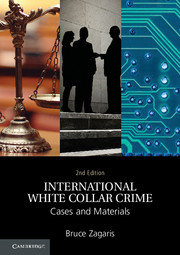Book contents
- Frontmatter
- Contents
- Preface
- 1 Introduction
- 2 Taxation
- 3 Money Laundering and Counterterrrorism Financial Enforcement
- 4 Transnational Corruption
- 5 Transnational Organized Crime
- 6 Export Control and Economic Sanctions
- 7 International Environmental Crimes
- 8 International Securities Enforcement
- 9 Extraterritorial Jurisdiction
- 10 International Evidence Gathering
- 11 Extradition and Alternatives
- 12 International Prisoner Transfer
- 13 The United Nations
- 14 The World Bank Group
- 15 INTERPOL
- 16 Economic Integration and Business Crimes
- Index
- References
15 - INTERPOL
Published online by Cambridge University Press: 05 November 2015
- Frontmatter
- Contents
- Preface
- 1 Introduction
- 2 Taxation
- 3 Money Laundering and Counterterrrorism Financial Enforcement
- 4 Transnational Corruption
- 5 Transnational Organized Crime
- 6 Export Control and Economic Sanctions
- 7 International Environmental Crimes
- 8 International Securities Enforcement
- 9 Extraterritorial Jurisdiction
- 10 International Evidence Gathering
- 11 Extradition and Alternatives
- 12 International Prisoner Transfer
- 13 The United Nations
- 14 The World Bank Group
- 15 INTERPOL
- 16 Economic Integration and Business Crimes
- Index
- References
Summary
Introduction
In September 1923, police chiefs from twenty countries met in Vienna, Austria, without diplomatic authority or instructions from their government, and formed the organization now known as the International Criminal Police Organization, or INTERPOL. The organization was established without the normal formality of a treaty ratified by member states. Although the absence of a treaty may make INTERPOL unconventional, police organizations and governments throughout the world have broadly participated in INTERPOL since its inception. As of May 1, 2009, 187 countries participate in INTERPOL, making it a truly universal organization in terms of its membership.
INTERPOL's mandate includes the investigation and suppression of drug trafficking, money laundering, bank fraud, smuggling, trafficking in illicit arms and stolen works of art, financial fraud, illicit electronic fund transfers, piracy of cassettes and videotapes, hijacking of planes and ships, theft, arson, and terrorism, as well as the tracking of fugitives from such offenses. INTERPOL assists in transmitting information about individual cases and fugitives as well as trends in crimes, but it does not actually conduct arrests. On white collar crime issues INTERPOL helps in the investigation and prosecution of cases, and it collects and disseminates data on crime trends and new police techniques. It also provides technical assistance, especially to developing countries, both on general police techniques and on responding to specific crimes.
Hypotheticals
1. Country X and Country Y do not have diplomatic relations. Country X has evidence that Mr. A, one of its nationals, in cooperation with Z entity, which has close relations with the government of Country Y, has been counterfeiting its currency and also trafficking drugs into Country X. Both Country X and Y are members of INTERPOL. Please advise Country X on what, if anything, INTERPOL may do to assist in preventing further criminal activities and helping arrest and prosecute Mr. A. and the Z entity. Would your advice differ if Country X had evidence that nationals of Country Y's navy crossed into its territorial waters to perform a security operation? In that situation, Country X has arrested them and is considering prosecuting them, but Country Y vigorously disputes that the action occurred in the territorial waters of Country X. Country X wants to prosecute agents, both governmental and nongovernmental, of Country Y that organized and assisted in the naval operation.
- Type
- Chapter
- Information
- International White Collar CrimeCases and Materials, pp. 586 - 634Publisher: Cambridge University PressPrint publication year: 2015



